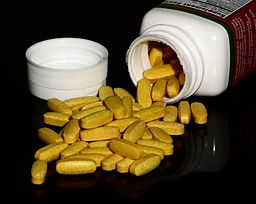Does One Really Need To Take Vitamins?
 People purchase tons of vitamins every year and they are supposed to do things like strengthen your mind, make your bones healthier and boost your immune system. You take vitamins to make sure you are as healthy as possible. However, with all the conflicting information out there, you may want to ask yourself if they are necessary?
People purchase tons of vitamins every year and they are supposed to do things like strengthen your mind, make your bones healthier and boost your immune system. You take vitamins to make sure you are as healthy as possible. However, with all the conflicting information out there, you may want to ask yourself if they are necessary?
In 2011, a study was published in the Archives of Internal Medicine and it found that many of the most commonly used vitamin supplements were associated with an increased mortality rate. The vitamins tested in the study and shown to have this association included synthetic multivitamins, vitamin B, folic acid, magnesium, copper, iron supplements and zinc.
What to Know About Vitamins
Many people take handfuls of supplements each day. Some may have a drawer or cabinet reserved just for vitamins. It’s common to believe vitamins will help you get the nutrients you need, even when eating a less than ideal diet. However, the nutrients and vitamins found in healthy, whole foods cannot be mimicked in a supplement.
Synthetic nutrients are very different than what a person would receive from eating a whole food. In order to create synthetic vitamins, a manufacturer must chemically separate vitamins and reconstruct them in an artificial process that hinges on certain chemical responses taking place.
Vitamins that occur naturally in while foods do not exist in isolated molecules. Instead these are found in whole foods that contain antioxidants, enzymes, and macronutrients and trace minerals. These help the body absorb and utilize the full benefits of whole foods. It is these elements in combination that are important for optimal health and it’s not something that can be imitated in a lab. Isolating vitamins and minerals might totally destroy any effectiveness they could have in the body and it may lead to vitamin toxicity.
A lot of people take a daily multivitamin or a combination of different ones because they aren’t eating a healthy diet. The typical diet of a Westerner is filled with processed, preserved, nutritionally deficient foods that are laden with chemicals that can be harmful to one’s health. Taking a vitamin supplement to balance the nutritionally deficient diet we eat most like will not impact the problems associated with poor eating habits.
Never Assume Vitamin Supplements are Safe
According to a survey hosted by the United States Food and Drug Administration, many consumers think that over-the-counter supplements are FDA approved. However, that’s not always the case. The U.S. Food and Drug Administration does not generally verify the information and claims made by supplement manufacturers. One indication of quality is the USP-verified mark which means the product has met the U.S. Pharmacopeia’s high standards.
A 2010 Consumer Reports investigation uncovered twelve supplements that a person should avoid at all costs and these include; aconite, lobelia, Yohimbe, comfrey, colloidal silver, coltsfoot, germanium, kava, greater celandine, bitter orange, country mallow and chaparral.
The best way to ensure you are getting enough vitamins is to eat a healthy diet. When you eat a diet rich in whole foods, you can be assured of getting all the nutrients and vitamins you need to stay at optimal health.
 Eating Disorder Self Test. Take the EAT-26 self test to see if you might have eating disorder symptoms that might require professional evaluation. All answers are confidential.
Eating Disorder Self Test. Take the EAT-26 self test to see if you might have eating disorder symptoms that might require professional evaluation. All answers are confidential.